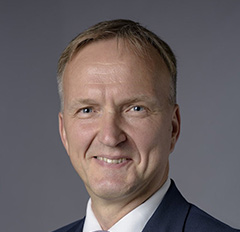The Peoria World Affairs Council hosted a virtual event on March 2 with Ambassador Andrejs Pildegovičs to discuss Latvia’s foreign policy goals, specifically regarding the invasion of Ukraine.
Pildegovičs is currently the Permanent Representative to the United Nations for the Republic of Latvia, a Baltic country in Europe bordered by Lithuania and Estonia. Pildegovič’s most notable roles include serving as Latvia’s Ambassador to the United States in 2007 before becoming the Ministry’s political director from 2012 to 2018.
Along with those roles, Pildegovičs was also press secretary of the foreign ministry from 1996 to 1998, as well as the foreign policy adviser to the president of Latvia from 2000 to 2006.
Peoria Area World Affairs Council member Mel Huang moderated and started the conversation with Pildegovičs about Latvia’s relationship with Ukraine and their foreign policy goals. Huang worked in foreign policy and mostly focused on the Baltic area.
“History is, in a way, repeating in a quite profound and tragic way,” Pildegovičs said “To some extent, my country is facing the same existential challenges which the generation of my grandparents have been seeing.”.
Latvia gained independence from Russia at the end of World War I. The leaders of Latvia, along with its neighbors, thought that they should remain neutral and thereby “invisible.” Isolationism was popular in Europe at that time, so these goals of being quiet were thought to be the best way to remain independent and prosperous. This strategy failed, as the country lost its independence during WWII after invasions by Soviet Russia, Nazi Germany and the Soviet Union.
During both World Wars, one-third of Latvia’s population was lost as a result of deportation, immigration and oppression. Thirty-two years ago, its independence was regained. After that, Latvian leaders concluded that they have to be committed to internationalists, be strong allies of the United States and be at peace with Europe.
“We are now a part of the European economy, the currency union. We are growing a developed democracy and digital economy. We want to be contributing to solutions, not problems, worldwide. That is our manifesto,” Pildegovičs said.
Feb. 24 was the one year anniversary of the illegal invasion of Russia against Ukraine. Latvia’s priority is helping Ukraine sustain their independence, prevail, repeal aggression and reconstruct.
Estonia and Latvia are the biggest providers of assistance towards Ukraine. Pildegovičs states that more than one percent of their national wealth is being offered as assistance to Ukraine in ways such as military, economic, financial, humanitarian and half a billion dollars in U.S. currency.
More than 60 percent of Latvian adults have donated to charities to help Ukraine and donated generators to help Ukraine survive the cold winter months.
“At the U.N., we have passed six different resolutions…being very clear in legal terms that this is [an] unprecedented act of aggression [and] that we don’t recognize any land grabs by Russia made using armed forces.”
Pildegovičs adds that the U.N. supports Ukrainian President Volodymr Zelenskyy’s peace plan and his guiding standpoints to gain peace in Ukraine. Pildegovičs made it clear that all efforts are going towards defending Ukraine in any way possible against the war crimes that have occurred.
Latvia is currently hosting around 40,000 Ukrainian refugees, mostly women and children, as military action makes it more difficult for men to leave the country. Russian refugees are also being let into Latvia, though they are only letting in Russians who can prove their opposition to Putin’s invasion.
Economic partnership is also very important to Latvia, as it wants to help the development of other regions. It is involved in regions in central Asia, the Caucasus and the Balkans to spread their knowledge of transition and change.
“Speaking about our priorities, we are also quite involved in the issues related to fighting disinformation, misinformation,” Pildegovičs said. “We have seen it in many years. In our case of course it was mostly hostile information from Russia.”
Disinformation from Russia has included comments about the origin of the pandemic and the vaccines, as well as vicious strikes concerning climate change. Pildegovičs goes on to say that Latvia is working to provide accurate information on these topics.
During the Q&A section of the event, an attendee asked if Latvia has suffered inflation or other economic effects due to Russia’s weaponization of energy. Pildegovičs responded by saying that Europe cut all energy connections with Russia. Russian gas was widely used for energy production in the Baltics, so cutting off those resources greatly spiked inflation during 2022.
Another question that was asked was if people should fear China’s support for Russia’s military needs or economic support. Pildegovičs started by adding that at the U.N., China represents the largest payer after the United States in their budget. China has been taking a cautious approach to the war, and just last week came up with a position paper to try and instigate peace in the Russia-Ukraine War.
China has not called for Russia to withdraw forces from the Ukrainian Territory, which Pildegovičs feels is a very important factor for peace. Along with this, China has been negatively targeting NATO enlargements, which is the admission of new countries into the treaty by unanimous votes. Latvia doesn’t agree with this and joined NATO in 2004.
Pildegovičs ended the Zoom event by answering the question of if Latvians should fear violence based on ethnic origins. He answered by saying that Latvia is a multiethnic society and has not experienced any violence based on ethnic lines.
“We are a multiethnic society…all citizens have equal rights.”





